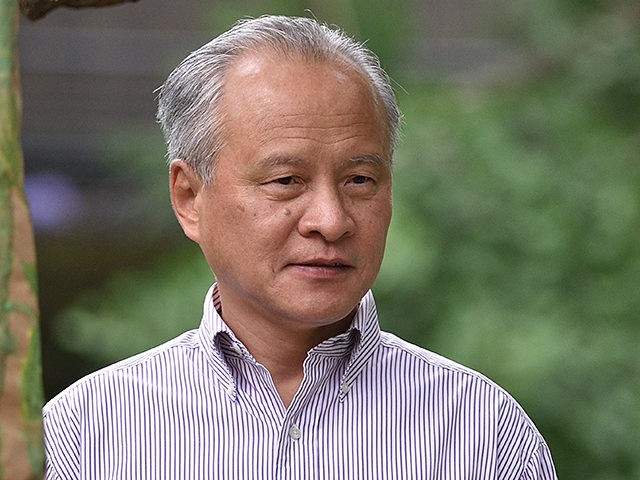China’s ambassador to the U.S. on Friday cited the presence of “social media influencers” in China’s western territory of Xinjiang as proof “stability has returned” to the region since the Chinese Communist Party (CCP) launched a genocide against Muslim Uyghurs in the territory in 2017.
“[T]he Chinese government has adopted correct and effective policies in Xinjiang, and stability has since returned. In the past several years, over 1,200 people from more than 100 countries have visited Xinjiang. Many social media influencers are seen on the streets doing interviews,” Chinese Ambassador to the U.S. Cui Tiankai told Xinjiang Gov. Shohrat Zakir, along with a virtual audience, at an online conference titled “Xinjiang is a wonderful land” on May 7.
“I myself have visited Xinjiang more than once. We have seen a real Xinjiang, which is totally different from what some Western politicians and media portrayed,” Cui said.
The “correct and effective policies” undertaken by the CCP in Xinjiang include forcefully detaining 1-3 million Muslim Uyghurs and other ethnic minorities in the territory, such as Kazakhs and Kyrgyz people, in concentration camps since at least 2017. Cui said on Friday the CCP’s security crackdown was necessary to combat “separatism, extremism, and violent terrorism” in Xinjiang by Uyghurs, who are predominantly Sunni Muslims. Survivors of the camps say infanticide and forced sterilization and abortions are a hallmark of the treatment Muslims face there, practices that fit the international legal definition of genocide.
The CCP has often said its detention camps in Xinjiang are designed to curb extremist ideology and “re-educate” Muslim minorities to adopt Han Chinese social customs along with the Marxist political doctrine of the ruling Communist Party. Beijing likewise claims that the camps are meant to steer Uyghurs away from terrorist activities and into the Chinese workforce.
Human rights organizations and foreign governments have accused Xinjiang’s CCP-run detention camps of facilitating Uyghur slave labor to produce Chinese goods exported worldwide, such as cotton. They have also accused the CCP of attempting to commit a genocide of Uyghurs in Xinjiang by forcing the labor camps’ female detainees to receive forms of birth control, including intrauterine devices (IUDs), or undergo sterilizations or abortions against their will.
Cui addressed the slave labor and genocide accusations on Friday during the virtual Xinjiang conference.
“The so-called ‘genocide’ is just a downright lie,” the Chinese ambassador said. “In the past 40 years, the Uighurs’ population in Xinjiang has grown by over 10 times — does that look like genocide?”
“‘Forced labor’ is another groundless talk,” Cui added.
“Workers in Xinjiang choose their jobs, including those in the high-income industry of cotton picking, on their own volition,” he claimed.
“They sign labor contracts as a free and equal party, their rights and interests are well protected, and they enjoy full remuneration. If making a decent living is ‘forced labor’, then should they only deserve ‘forced poverty’ and ‘forced unemployment’?” Cui asked.

COMMENTS
Please let us know if you're having issues with commenting.